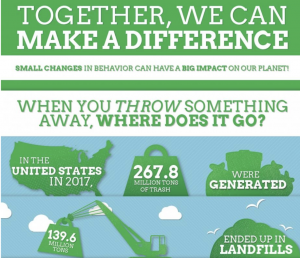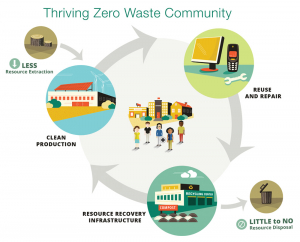Why I’m a ZWA – The Impacts of Waste Reduction
By: Jack Miklaucic, Sophomore in Emory College, Environmental Science and PPL double-major
Modern life, particularly in industrialized and wealthy countries, is vastly different than it was just a century ago. The development and popularization of single-use plastics and industrial farming techniques has led to staggering amounts of waste. The U.S. produces more than 30% of the planet’s total waste despite representing only 4% of the world’s population, and a Columbia University study estimated that Americans throw out 7 pounds of materials per person every day (1, 2). Containers and packaging alone make up almost 30% of U.S. landfill waste, with food waste accounting for an additional 15% (1). While much of the waste mismanagement crisis is due to irresponsible manufacturing and economic incentives, individuals have the power to significantly reduce their waste production and experience the associated benefits.

Reducing our waste production could have a meaningful positive impact on the environment and also reduce greenhouse gas emissions. Municipal solid waste landfills are the third-largest source of human-related methane emissions in the United States, accounting for approximately 14.1% of these emissions in 2017 (3). Reducing waste is also a meaningful first step towards changing today’s linear material economy in which goods are produced to be used once and disposed of. The processes associated with this structure—extracting resources, producing goods, disposing of waste, and transporting materials—are responsible for about 42% of U.S. greenhouse gas emissions (4). Landfills and incinerators also emit heavy metals and dioxin into the air and pose dire threats to groundwater (5).
Fortunately, moving towards a zero-waste economy and lifestyle is absolutely possible. If you haven’t already, check out our previous blog posts for lots of tips on individual actions you can take to reduce your waste production, from starting a compost to purchasing reusable grocery bags. On a larger scale, institutions like Emory are displaying tremendous leadership and making great strides in diverting landfill waste. Germany now recycles and composts 87% of discarded materials and has no active landfills, reflecting a monumental transition over the past decade (6). San Francisco is another great example of successful waste reduction, diverting 80% of landfill waste (7). These changes are possible, but they require dedication and commitment on the part of individuals to do their part by sorting their waste and making informed choices as consumers. At Emory, we all have the wonderful opportunity to practice reducing our waste in a space that provides us so many resources to succeed.

https://www.biocycle.net/how-your-community-can-be-zero-waste-in-10-years/
Waste reduction is clearly an issue of great importance to environmental health and emissions reduction initiatives. I’m a Zero Waste Ambassador because I want to help institutions like Emory and students like us lead the way toward a more sustainable future. I hope that you will join me in that fight and make full use of Emory’s excellent waste diversion options. I also implore you to consider how you can reduce waste in other environments, because those small changes have the power to make a big impact. Thanks so much for reading and good luck on your waste reduction journey!
Works Cited
(1) U.S. Environmental Protection Agency (EPA), Advancing Sustainable Materials Management: 2014 Fact Sheet, November 2016.
(2) Fresh Air, “Following Garbage’s Long Journey Around the Earth,” National Public Radio, 26 April 2012.
(3) USDA, Food Loss and Waste, accessed 28 August 2020.
(4) U.S. EPA, Documentation for Greenhouse Gas Emission and Energy Factors Used in the Waste Reduction Model (WARM), March 2015.
(5) Global Alliance for Incinerator Alternatives, An Industry Blowing Smoke: 10 Reasons Why Gasification, Pyrolysis & Plasma Incineration Are Not “Green Solutions,” June 2009.
(6) We Future Cycle, Waste Management in Germany, 87% Recycling Rate, accessed 28 August 2020.
(7) San Francisco Department of the Environment, Zero Waste – Frequently Asked Questions, accessed 28 August 2020.


Amazing infographic. Easy to digest
Interesting post and I must say I was educated by this article.
Very useful blog on waste reduction. Here i have learned a lot, the bad impacts of waste things on environment and of course we all should be aware of it. stay healthy, make the earth refreshed
Yes that’s true in a third world country you can easily tell by the landfill it produced that you cant deny third world countries have the highest plastic waste generated. If only factories can eliminate using plastics as part of their product components.